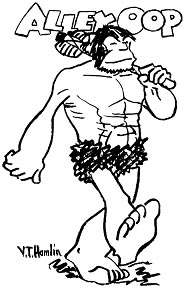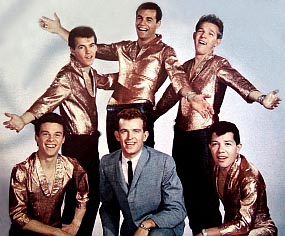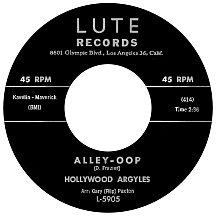HOLLYWOOD ARGYLES
Alley-Oop
Iowa-born comic strip artist V.T. Hamlin had a fascination with the Paleolithic "caveman" age of a couple million years ago as well as the Mesozoic "dinosaur" era that happened much, much earlier. As a child he drew cartoonish cavemen and as an adult the idea became a character he called Alley Oop, a loincloth-wearing, stone weapon-wielding citizen of the Kingdom of Moo during the made-up "Bone Age" when dinosaurs and men coexisted, at least in Hamlin's imagination and other popular fiction. Alley had a dinosaur pal named Dinny, a rhyme-talking best buddy named Foozy and a girlfriend, Ooola (as in "ooo-la-la"), who bore more than a passing resemblance to Hamlin's real-life wife Dorothy. The daily black-and-white Alley Oop strip began publication in December 1932 and a color Sunday feature was added in '34. Alley's exploits weren't limited to prehistoric times; in 1939, a time machine became an important part of the storyline, giving Oop and Ooola the opportunity to visit a variety of historic (in their case futuristic) places and time periods, including America in the 20th century. Hamlin retired after nearly 40 years of doing the strip; other writers and artists throughout the years have kept the series going.
Oop was further entrenched in pop culture some two decades later when a novelty song about the caveman comic character was written by Oklahoman Dallas Frazier; he'd made his first record for Capitol in 1954 at the age of 14 and wrote "Alley-Oop" three years later. Another three years went by and Frazier's goofy tune became a hit by a music group with essentially one member: Gary Paxton. The Kansas-born singer-songwriter had met Clyde Battin at the University of Arizona and they formed a band called The Pledges. After two single releases for the Rev label of Phoenix (one under the group's name and the other as Gary and Clyde), they went their separate ways...but not until recording "It Was I" and a few other tracks, which they'd left with Bob Shad of Brent Records. Months went by and Shad decided to release the song but didn't know who the artists were, so the disc was pressed with the names Skip and Flip (after his wife's pet poodles). By May of '59 the single began getting airplay in many U.S. cities on its way to the national top 20 and before long Gary and Clyde were at Shad's doorstep, ready to take advantage of the situation. Skip and Flip had three charting singles, with "Cherry Pie" returning them to the top 20 the following spring before the duo parted for good.
As soon as Paxton gained access to a recording studio, he spent most of his waking hours writing, recording and familiarizing himself with the many facets of making records. In mid-1960 he moved to Los Angeles and began working with Kim Fowley, a local songwriter and promoter (who some have said lived on a "different planet" than the rest of us), resulting in the creation of a huge novelty hit. It was essentially a solo effort by Paxton using musicians and friends who happened to be hanging out in the hallways of a small La La Land studio. The Lute Records single showed Gary "Flip" Paxton as arranger, but he skipped the lead vocal credit to avoid a conflict of interest with his Brent Records contract. He came up with Hollywood Argyles after the streets that intersected right outside the studio: Hollywood Boulevard and Argyle Avenue. A group on the Brent label from Long Island, The Argyles ("Vacation's Over," late '59), had no involvement whatsoever.
'There's a man in the funny papers we all know...' made for an obvious introduction to the guy who '...don't eat nothin' but a bear cat stew' and had a 'genuine dinosaur-uh' for a chauffeur. Deejays enjoyed Paxton's crazy vocals and young listeners jammed radio station phones with requests; it broke first in San Bernardino in mid-April and spread through Southern California within days. Cover versions quickly surfaced; René Hall produced a Los Angeles studio group version (with H.B. Barnum and singer Jimmy Norman) billed as The Dyna-Sores on Rendezvous Records, which broke in Chicago in early May. L.A. group Danté and the Evergreens (led by 18-year-old Donald "Danté" Dowdy) released their take on the Madison label and it developed out of New Orleans soon afterwards. The race was on with the Hollywood Argyles way out in front, hitting number one in mid-July while Danté made a solid top 20 showing despite having the more popular version in New York City and several other markets; by that time the Dyna-Sores disc had lost momentum. 'He rides through the jungle tearin' limbs off-a trees...knockin' great big monsters dead on their knees!' The zany Argyles recording of the Frazier song that had millions singing along in the summer of 1960 had emerged victorious.
Paxton assembled a Hollywood Argyles band (Little Bobby Rey, Ted Marsh, Gary Webb, Ted Winters and Deary Weaver, all shown on the cover of the act's one and only album). Hollywood Argyles follow-up 45s include "Gun Totin Critter Called Jack" and a play-it-straight remake of The Fiestas' 1959 hit "So Fine," the latter receiving airplay on L.A. stations and a few other places. The label gave credit to Gary "Alley Oop" Paxton as arranger, despite the ongoing appearance of "new" Skip and Flip releases. At year's end, "You Been Torturing Me" on Paxley (note the label), a sickly humorous discourse on revenge against a contemptuous ex, faced competition from a near-soundalike version by The Four Young Men on Crest that gained the edge in airplay.

Fowley and Paxton continued producing and arranging for other recording acts separately and together, hitting pay dirt with classical-to-rock instrumentals for B. Bumble and the Stingers ("Bumble Boogie") and Paul Revere and the Raiders ("Like, Long Hair"). The partnership split up in mid-'61. Paxton's next Hollywood Argyles project was a doo woppish number, "See You in the Morning," on another small label, Finer Arts. Gary recorded two singles under his own name for Liberty in 1962; the first was a fun, slightly unhinged take on the five-year-old Tommy Sands hit "Teen Age Crush." The second, "Alley Oop Was a Two-Dab Man," was a "part two" of sorts that suggested Mr. Oop used Brylcreem ("A little dab'll do ya!") hair gel. Gary's second ride to the top came immediately afterwards with his production of "Monster Mash" by Bobby (Boris) Pickett on the Garpax (Gary's name, get it?) label, a number one hit just in time for Halloween '62 and ongoing favorite every autumn since. He produced two more "monster" records for Pickett over the next couple of years.
The "original" (post-"Alley-Oop" session) Hollywood Argyles were no more, but Paxton persisted, making occasional records under the group's name with whoever was around at any given time. The next disc, issued in the spring of '63, was "(My Real Boss) The Bossy-Nover," a takeoff on the bossa nova trend (and dance) with an unconvincing Speedy Gonzalez-style lead vocal. Next came "Spookie Movies" for Liberty under his own name, a lighter attempt at extending the "Monster Mash" momentum, but it didn't take. He had slightly better luck with his original hot rod song "The Scavenger" on Garpax; Dick Dale's tougher-sounding cover a few months later on Capitol landed on the national charts.
So...how many silly novelty records on a heap of obscure record labels can one guy put out before his head explodes? Apparently quite a few. The mostly-spoken "Watermelon Song" on Trill was credited to The Hollywood Argyles (as was the previous single, the first to tack "The" onto the name). Gary entered 1964 with a Ray Stevens "Ahab" ripoff, "Two Hump, Dual Bump Camel Named Robert E. Lee" as Gary Paxton & the ?'s. The following year he tried to regain any seriousness he possesed with "In My Way (Of Loving You)" on Capitol, then reteamed with Fowley, who arranged a Hollywood Argyles (without the "The") single for Chattahoochee, "Long Hair, Unsquare Dude Called Jack," Gary's first "hippie" novelty. The chart-topping group (whoever they were by that time) had their final release on the even-more-obscure Kammy Records as New Hollywood Argyles in late 1965; "Alley Oop '66" (the hyphen had disappeared and reappeared over the years) was nothing more than a reissue of the original recording that didn't survive into the year that was plastered on the label. Then Gary got involved with an arguably more respectable project for Capitol Records: "The Lurch" by Ted Cassidy as Lurch (from ABC-TV's The Addams Family), "with the Music of Gary Paxton" emblazoned under the imposing six-foot-nine-inch "You rang?" vocalist's name. Old habits die hard.

In the spring of 1966, Dallas Frazier became a legitimate hitmaking singer with "Elvira" (which has a suspicously similar rhythmic structure to "Alley-Oop"); he'd avoided recording his famous novelty composition until the making of his Elvira album on Capitol. By that time the song had been recorded by at least a dozen artists: a cover by The Pre-Historics, "Alley-Oop Cha-Cha-Cha," had failed to compete with the three charting versions in 1960. The Four Preps parodied the song in their hit 1961 medley "More Money For You and Me." It was remade by French songstress Sylvie Vartan and The Beach Boys, both in 1965, and Brian Poole's group The Tremeloes loved it so much they recorded two distinctly different versions (the second veddy British) in 1963 and '66.
Kim Fowley followed a similar but more bizarre path in comparison to Gary, recording well over a dozen singles in the '60s and early '70s for nearly as many small (and a few large) record labels. His most notable song would likely be "The Trip" from 1965, a lyrically psychedelic two-minute glimpse into the near future. In the 1970s he formed all-girl rock band The Runaways, among other achievements, and managed to maintain a consistent presence on rock music's fringes. Gary Paxton began leaning in a new direction in '67 with his countrified recording of Ernie K-Doe's "Mother-In-Law" on Capitol. He moved to Nashville and immersed himself in country music production, winning a Grammy in the Best Inspirational Performance category for his 1976 NewPax album The Astonishing, Outrageous, Amazing, Incredible, Unbelievable, Different World of Gary S. Paxton. As for Alley Oop, the 'toughest man alive' who 'wears clothes from a wildcat's hide' and is 'the king of the jungle jive,' he still has a sizeable number of fans...who follow the comic strip and might even find it hard not to sing along when the song emerges from the recesses of their brains.


